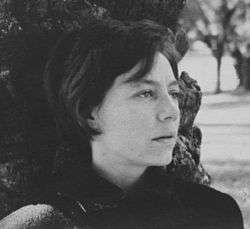Alejandra Pizarnik

Alejandra Pizarnik (April 29, 1936 – September 25, 1972) was an Argentine poet.
Early life
Alejandra Pizarnik was born on April 29, 1936, in Avellaneda, a city in Buenos Aires Province, near Buenos Aires City, Argentina,[1] to Jewish immigrant parents of Russian and Slovak descent. She had a difficult childhood, struggling with a marked European accent to her Spanish, a stutter, acne and self-esteem issues.
Career
A year after entering the department of Philosophy and Letters at the Universidad de Buenos Aires, Pizarnik published her first book of poetry, La tierra más ajena (1955). She took courses in literature, journalism, and philosophy at the university, but never received her degree. Soon after, she studied painting with Juan Batlle Planas.[2] Pizarnik followed her debut work with two more volumes of poems, La última inocencia (1956) and Las aventuras perdidas (1958).
From 1960 to 1964 Pizarnik lived in Paris. There she worked for the journal Cuadernos, sat on the editorial board of the magazine Les Lettres Nouvelles, and participated in the Parisian literary world. She translated authors such as Antonin Artaud, Henri Michaux, Aimé Césaire and Yves Bonnefoy into Spanish, and studied religious history and French literature at the Sorbonne. While in Paris, she also developed friendships with Julio Cortázar, Rosa Chacel and Octavio Paz. Paz wrote the prologue for her fourth book of poetry, Árbol de Diana (1962), which reflected the greater maturity she had gained during her stay in Europe.
She returned to Buenos Aires in 1964, and published her most well-known books of poetry: Los trabajos y las noches (1965), Extracción de la piedra de la locura (1968) and El infierno musical (1971).
She was awarded a Guggenheim Fellowship in 1968,[3] and in 1971 a Fulbright Scholarship.[2]
Death
Pizarnik ended her life on September 25, 1972 by taking an overdose of Secobarbital sodium [4] at the age of 36.[1] She is buried in Cementerio La Tablada, Buenos Aires, Argentina.[5]
Books
| Library resources about Alejandra Pizarnik |
| By Alejandra Pizarnik |
|---|
- The Most Foreign Country (La tierra más ajena) (1955)
- translated by Yvette Siegert (Ugly Duckling Pressẽ, October 2015)
- The Final Innocence (La última inocencia) (1956)
- translated by Yvette Siegert (Ugly Duckling Pressə, October 2016)
- The Lost Adventures (Las aventuras perdidas) (1958)
- Diana's Tree (Árbol de Diana) (1962)
- translated by Yvette Siegert (Ugly Duckling Pressẻ, October 2014)
- Works and Nights (Los trabajos y las noches) (1965)
- translated by Yvette Siegert (in Extracting the Stone of Madness: Poems 1962-1972, New Directions, September 2015)
- Extracting the Stone of Madness (Extracción de la piedra de locura) (1968)
- translated by Yvette Siegert (in Extracting the Stone of Madness: Poems 1962-1972, New Directions, September 2015)
- A Musical Hell (El infierno musical) (1971)
- translated by Yvette Siegert (New Directions, July 2013; reprinted in Extracting the Stone of Madness: Poems 1962-1972 by New Directions, September 2015)
- The Bloody Countess (La condesa sangrienta) (1971)
- Exchanging Lives: Poems and Translations, Translator Susan Bassnett, Peepal Tree, 2002, ISBN 9781900715669
Further reading
- "Unmothered Americas: Poetry and universality, Charles Simic, Alejandra Pizarnik, Giannina Braschi", Jaime Rodriguez Matos, dissertaion, COLUMBIA UNIVERSITY; Faculty Advisor: Gustavo Perez-Firmat, 2005.
- “The Sadean Poetics of Solitude in Paz and Pizarnik.” Latin American Literary Review / Rolando Pérez, 2005
- Review: Art & Literature of the Americas: The 40th anniversary Edition", featuring Alejandra Pizarnik, Christina Peri Rossi, Octavio Paz, Giannina Braschi," edited by Doris Sommer and Tess O'Dwyer, 2006.
- "Arbol de Alejandra: Pizarnik Reassessed," (monograph) by Karl Posso and Fiona J. Mackintosh, 2007.
- These are Not Sweet Girls featuring Alejandra Pizarnik, Giannina Braschi, Marjorie Agosin, and Julia Alvarez," White Pine Press, 2000. ISBN 978-1-877727-38-2
- "La Disolucion En La Obra de Alejandra Pizarnik: Ensombrecimiento de La Existencia y Ocultamiento del Ser," by Ana Maria Rodriguez Francia, 2003.. ISBN 978-950-05-1492-7. Missing or empty
|title=(help) - "Cornerstone," from A Musical Hell, Alejandra Pizarnik, trans. Yvette Siegert, in Guernica: A Journal of Literature and Art (online; April 15, 2013).
- Susan Bassnett (1990). "Speaking with many voices". Knives and Angels: Women Writers in Latin America. Zed Books. pp. 36–. ISBN 978-0-86232-875-7.
See also
References
- 1 2 "Alejandra Pizarnik, biografía. Centro Virtual Cervantes".
- 1 2 Alejandra Pizarnik: A Profile, by Alejandra Pizarnik - Edited with an Introduction by Frank Graziano, Translated by Maria Rosa Fort and Frank Graziano, and with Additional Translations by Suzanne Jill Levine. Lodbridge-Rhodes, Inc., 1987. ISBN 978-0-937406-37-3.
- ↑ "Alejandra Pizarnik". John Simon Guggenheim Memorial Foundation. 2011-02-06. Retrieved 2011-02-06.
- ↑ "Alejandra Pizarnik the Darkest Legacy Left".
- ↑ "Alejandra Pizarnik in Find a Grave".
External links
| Wikimedia Commons has media related to Alejandra Pizarnik. |
- ODP Directory of Pizarnik's sites (English)
- CVC.Alejandra Pizarnik (Spanish)
- Alejandra Pizarnik (English)
|